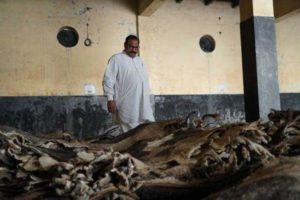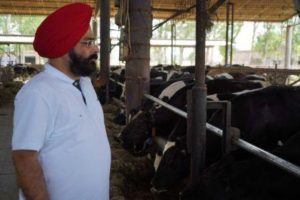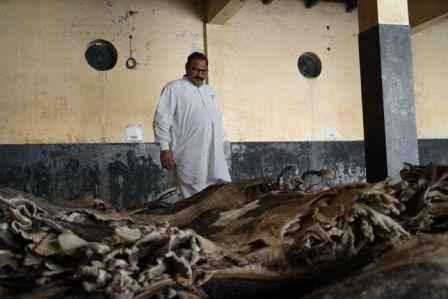A sweeping ban on trading cattle for slaughter, imposed by India’s Government to appease its ultra conservative Hindu vote-base, is being seen by the nation’s meat and leather industries as an attempt to destroy businesses ultra conservative Hindus do not agree with.
Other critics argue the ban is an attempt to control what people eat, and accuse the Government of using prevention of cruelty as a justification for imposing Hindu values.
“They [the Government] want to destroy people engaged in leather industry,” said Seth Satpal Mall, a hide trader in Punjab’s industrial hub, Jalandhar.

“They just want to kill us.”
The snap Government decree, issued last week, requires documentation proving any cattle sold are for “agricultural purposes” only, effectively outlawing trade for slaughter.
Exports, livelihoods at stake
Mr Satpal is uneasy because it means his livelihood, along millions of others and $14 billion in meat and leather exports, is suddenly on the line.
Largely secular India is one of the world’s largest beef exporters, that’s a fact that the government seemingly wants to ignore.
Abdul Faheem Qureshi is president of the Muslim Committee that represents the cause of meat sellers.
“These rules are made targeting one particular community,” said Mr Qureshi, referring to the predominantly Muslim-operated slaughterhouses and tanning industries.
The ban’s impact was immediate he said, forcing the closure of meat shops and markets.
Many Indian states already outlawed cow slaughter, but this nationwide trading ban — which the Government said was for animal protection — also applies to buffaloes and older cattle for their hides.
That also worries dairy farmers like Daljit Singh Gill, who said dairying depended on being able to sell cows no longer producing milk.
“The new rules are going to affect my business, they are going to badly affect dairy farmers across country,” he said.
Disagreement over motivation for ban
 Dairy owner Daljit Singh Gill
Dairy owner Daljit Singh Gill
PHOTO: Dairy owner Daljit Singh Gill says dairying depends on being able to sell cows that no longer produce milk. (ABC News: James Bennett)
Mr Singh Gill said he believed the ban was because “they [the Government] are crazy about cow protection”.
For conservative Hindus, the cow is a sacred mother figure.
Mr Qureshi said its an attempt by the Hindu nationalist Government to suffocate an industry its religious conservatives disagree agree with.
“Its a violation of the fundamental rights given to the citizens of India,” he said.
“They have made these rules with the intention of political benefits.”
But NG Jayasimha, a lawyer and former member of India’s Animal Welfare Board who helped draft the ban, disagreed.
“There’s a lot of cruelty in the supply chain and this was a genuine attempt to regulate it,” he said.
Concern over vigilantes
There are also fears the ban could endanger lives.
India’s cattle handlers say zealous “cow-protection” groups, often associated with the ruling party’s cultural wing, the RSS, have become bolder and more violent.
Two months ago in the northern state of Rajasthan, five Muslim men falsely accused by a mob of cow protection vigilantes of taking cows for slaughter were badly beaten. One, a 55-year-old man, died from his injuries.
“There’s already been an increase in vigilantism,” hide trader Seth Satpaul said.
“They catch and beat people who are bringing skin and hide from villages. It is happening all over the country.”
‘Right to beef’?
In parts of India where beef consumption is more common — the less religious north-east and Tamil dominated south — the ban is being challenged on the grounds it infringes Indians’ right to choose what they eat.
In Chennai, the Madras High court has stayed the order, and there is talk of a Supreme Court challenge as well.
The issue looms as a divisive cultural battle for a Government which has championed inclusive economic development, but always been vulnerable to criticism it sought to reshape India as a Hindu nation.
However, opponents say they will fight to preserve what they say is the country’s founding secular ideal. The slaughter ban has caused some of the more secular minded members of the BJP to resign from the party in the North eastern states.
Following heavy criticism, one Government minister Venkaiah Naidu was quoted by news agency the Press Trust of India as saying that concerns surrounding the ban were “being looked at”.
[with inputs from ABC news]


